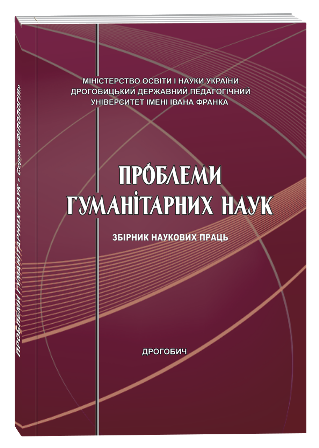REPREZENTATION OF DROHOBYCH OF INTERWAR PERIOD AND THE FIRST YEARS OF WAR THROUGH THE PRISM OF TRAUMATIK MEMORY OF THE NOVEL-
DOI:
https://doi.org/10.24919/2522-4557.2018.42.151932Keywords:
individual memory, collective memory, the Holocaust, traumatic memory, narrative-testimonyAbstract
The article deals with an analysis of the representation of Droho-bych of interwar period and the first years of war through the prism of traumatic memory. The subject of the research has been chosen the novel-testimony of the Polish writer of Jewish origin Henry Greenberg «Drohobych, Drohobych». The subject of the analysis of the article became the traumatic memory about Drohobych, the hero-narrator of the testimony of Pold Lustig, of real person, a former inhabitant of Drohobych, who survived the Holocaust at first in his town, and then in various camps in Poland.
The projection of notion of memory to the «literature of fact», in particular to the testimony has been carried out on the basis of the developed basic scientific re-search on memory, particularly the works of M. Halbwachs, P. Nora and A. Ro-senbeld. The reasons of authors’ appeal to this kind of prose have been substan-tiated. It has been found out that works of this genre appeared in the literature of the twentieth century as a result of experienced traumatic experience, including wars and post-occupation. The mechanisms of work of traumatic memory in the text of the testimony have been highlighted, which is the most commonly represented period of the Holocaust. Such texts are intended not only to testify about the pain of the past, but also have therapeutic function. It has been established the dependence of individual memory of the author and the collective memory of people from the ex-perienced traumatic experience. It has been proved that the category of traumatic memory needs further research. Understanding the mechanisms and consequences of its work in an individual, collective, national and international dimension will allow for a common dialogue between the conflicting parties.
References
Альбвакс М. Коллективная и историческая память / М. Альбвакс // Непри-косновенный запас. Дебаты о политике и культуре. – 2005. – № 2–3 (40–41). – С. 12–15.
Нора П. Всемирное торжество памяти / П. Нора // Неприкосновенный запас. Дебаты о политике и культуре. – 2005. – № 2–3 (40–41). – С. 37–51.
Budzyński W. Miasto Schulza / Wiesław Budzyński. – Kraków, 2005. – 456 s.
Grynberg H. Drohobycz, Drohobycz / Henryk Grynberg. – Warszawa, 1997. – 293 s.
Grynberg H. Dziedzictwo / Henryk Grynberg. – Londyn, 1993. – 90 s.
Jarzębski J. Schulz / Jarzębski Jerzy. – Wrocław, 1999. – 242 s.
Rosenbeld A. Podwójna śmierć: rozważania o literaturze Holocaustu / Alvin Ro-senbeld. – Warszawa, 2003. – 273 s.



